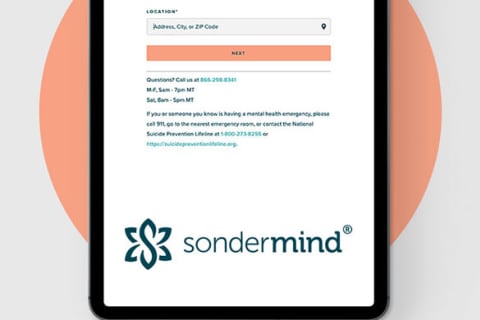Advertisement
Here's How To Get Exactly What You're Looking For Out Of A Therapy Session

At mbg, we're all about sharing new ways to grow and improve so that we can help our community become the best versions of themselves. Implementing a regular fitness routine and a diet full of nutritious veggies is important, but nourishing your mental and emotional health can be the difference between well-being and stagnation.
Whether you struggle with a diagnosed mental illness or not, utilizing mental wellness services through platforms like SonderMind provides important benefits for overall well-being. While about 85% of the world's population is without a diagnosed mental illness, that doesn't mean they're all "mentally well." We all face chronic stress, worry, loneliness, and other challenges that can create bigger problems.
The connection between mental wellness and well-being.
The Global Wellness Institute defines "mental wellness" as "an internal resource that helps us think, feel, connect, and function; it is an active process that helps us build resilience, grow, and flourish." Practices that improve mental wellness not only protect against the symptoms of mental illness but also decrease the chances of actually developing one. Good mental wellness is also linked with a variety of positive outcomes, such as better physical health, longevity, social relationships, and work performance [*][*]. And self-improvement through therapy is one of the No. 1 ways to increase mental wellness.
Therapy: Where to start.
Often the hardest part of starting your therapy journey is finding a therapist that works for you. But SonderMind takes the confusion, stress, and wait time out of finding a mental health professional by matching you with a licensed therapist based on your specific needs. With telehealth and in-person options, their platform offers convenient and affordable care, partnering with most major insurance companies and government programs. Once paired with an available therapist with the right techniques and specialties, SonderMind puts you in control of your outcomes using feedback-informed care. This includes providing critical insights directly to your therapist, allowing for goal-based personalized treatment plans.
How to get the most out of your therapy session.
While therapy offers many benefits, the effectiveness can vary based on your relationship with the therapist, as well as what you're getting out of each session. To help you approach your journey with confidence and ease, we talked to an expert at SonderMind, who provided us with the top five tips for getting the most out of each session:
- Be upfront about your goals: Sharing your goals with your therapist is key. If you're unsure about what your goals are, try communicating your challenges. As long as you have an honest dialogue with your therapist, together you can discuss a plan for therapy that best meets your needs. This plan can then serve as a "road map" for measuring progress.
- Come open-minded: Most people don't like change, which means hearing a different perspective may not be easy. Taking a critical look at yourself doesn't always feel good, but keep in mind that it gets easier as you and your therapist build trust. Also, be open to working on new habits and skills. One reason therapy works is because it helps to identify and learn new behaviors and to change unhelpful life patterns and points of view.
- Actively participate during and in between sessions: Clients who actively participate in therapy feel more connected to their goals. Reflecting on therapy discussions between sessions can also assist with changing behaviors and identifying opportunities to practice new skills. Sharing the between-session experiences with your therapist helps them to understand what is working and in what areas you need more support.
- Ask questions: A good therapist wants to know how to improve your time together and is open to feedback. Make sure to ask questions if what the therapist recommends is confusing or if what they are reflecting back to you doesn't feel right.
- Reflect on the relationship: A common experience in therapy is feeling uncomfortable sharing personal matters with a stranger. However, this discomfort is different from feeling uneasy with the therapist's approach or style of communication. If you don't feel heard or respected by the therapist, that is a sign that it may not be a good fit. Take the time to reflect on whether you're experiencing the vulnerability of sharing sensitive information or the therapist-client relationship doesn't feel right.
Ask and you shall receive.
A healthy wellness routine means giving equal attention to the mind as we do the body. And as much meditating and self-reflecting as we can do on our own, we all have our blind spots. Not only does personal growth take a commitment to ourselves, but it also requires asking others for help. But finding the right therapist and approaching the journey clearheaded and prepared is the key to success. With the right therapist and the right attitude, the potential for growth can be endless.

